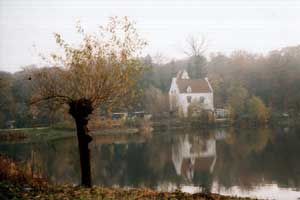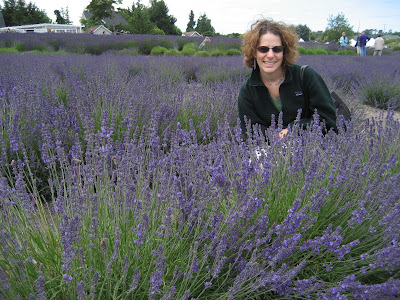 Belgium is a nation divided: 11 provinces, 5 major political parties, three regions, two languages, one king. And all in a country that is roughly the size of Maryland. This generally means that one can be situated in one village, enjoying a beer in a cafe in Flanders surrounded by the calm, introverted Flemish, and then go for a light stroll and wander into the fiery French side of the country. In Leuven, for instance, we are only a few kilometers from the linguistic divide, though you might never know it: French is TABOO. In fact, the Flemish are very proud of their language and will go to great lengths to not speak French: English is OK, Italian, Spanish, they might even slip into Afrikaans, a closely-related language, just to avoid their other native tongue. To be fair, I hear it is quite the same on the other side of the border.
Belgium is a nation divided: 11 provinces, 5 major political parties, three regions, two languages, one king. And all in a country that is roughly the size of Maryland. This generally means that one can be situated in one village, enjoying a beer in a cafe in Flanders surrounded by the calm, introverted Flemish, and then go for a light stroll and wander into the fiery French side of the country. In Leuven, for instance, we are only a few kilometers from the linguistic divide, though you might never know it: French is TABOO. In fact, the Flemish are very proud of their language and will go to great lengths to not speak French: English is OK, Italian, Spanish, they might even slip into Afrikaans, a closely-related language, just to avoid their other native tongue. To be fair, I hear it is quite the same on the other side of the border.
Belgium straddles not only the linguistic but also the cultural boundary between Romantic and Germanic Europe. It was with this in mind that a friend took it upon herself to introduce me to the French side of Belgium. So this past Saturday I found myself taking a 20-minute train ride out of Leuven and on my way to hear the music of one of France's most beloved singer-songwriters: Georges Brassens.
Georges Brassens is apparently a legend within the community of French-speaking Europeans. His music is heartfelt and personal, and his songs are often narratives with morals that appeal to both children and adults. The concert, performed by a very good cover band, took place at the L'Os a Moelle, an intimate private club with little more than a stage, some chairs, and a bar. Both Jacques Brel and the jazz harmonica player Toots Thielemans had both performed here. It was quintessentially European in that there were clearly about ten times as many people in this place as any fire marshall would have allowed, and everyone seemed to know everyone else. Many people sang along with every song. There were tears after the more somber pieces as people reminisced about the good old days. My friend and I sat so close to the stage that I could practically see the nose hairs moving with every breath the singer took. It was wonderful.
Brassens died in 1981, and during his life his music was rarely performed outside of his home country. But thanks to many idols that have continued his music both during his life and today, he has achieved an international reputation. Some of my favorite songs from the evening included "Les amoureux des bancs publics," about young lovers who kiss unabashedly in front of strangers, and "La mauvaise reputation," a kind of semi-autobiography. To read more about Brassens check out www.georges-brassens.com.
 One of the best things about living in Leuven is that, despite the sardine-like way we inhabitants are crammed into its downtown streets, it doesn't take long to escape into the Flemish countryside. A friend recently suggested that I try one of a variety of walking paths that criss-cross Belgium, connecting larger cities with tiny villages that might otherwise be inaccessible to those without a car or, sacreligious as this may seem for a student living in Flanders, a bicycle. So, with little else to do on Sunday afternoon and the fall colors nearing their peak, I armed myself with a local map and set out for the little spot know as Zoet Water.
One of the best things about living in Leuven is that, despite the sardine-like way we inhabitants are crammed into its downtown streets, it doesn't take long to escape into the Flemish countryside. A friend recently suggested that I try one of a variety of walking paths that criss-cross Belgium, connecting larger cities with tiny villages that might otherwise be inaccessible to those without a car or, sacreligious as this may seem for a student living in Flanders, a bicycle. So, with little else to do on Sunday afternoon and the fall colors nearing their peak, I armed myself with a local map and set out for the little spot know as Zoet Water.
The path began just beyond the "ring road" that surrounds Leuven center. Almost immediately upon leaving the city I walked into Kasteelpark Arenberg, the beautiful grounds that is home to the Arenberg Castle, now the University School of Architecture. I could happily have ended my trip here, wandering the canals and kicking around in the leaves. Upon leaving the park I unfortunately lost the path, but with my map I headed towards Heverleebos. The forest itself is not that spectacular; it's rather bland in that northern-Michigan sort of way. But there were no cars, no students, and lots of fresh air and sunshine. After what had been nearly three hours of happy rambling, I left the forest and came out into Zoet Water.
Zoet Water, simply "Sweet Water," is a little chain of ponds nestled between Heverleebos and Meerdaalwoud. In the 50s and 60s it was a popular vacation destination, and so today this little "rural" spot is surrounded with cafes, well-worn waling paths, and a children's park complete with petting zoo and go carts. But on an autumn day in late October I only encountered a small scattering of families, solitary fishermen, and the occasional camera-wielding tourist.
Zoet Water has its share of historical sights. The most remarkable is the quaint Kapel van O. L. V. van Steenbergen. Constructed in the early 17th century, it has supposedly been the sight of a number of miracles. Today its simple altar is adorned with carvings of tree branches and flowers, reflecting the feel of the forest in which it is nestled.
Rather than take the woods-y way back, I headed up the roads back towards Leuven. After I was beginning to think I had made a wrong choice (cars, no interesting shops) I stumbled across a little roadside Marian shrine. It was magnificent. It was covered in vines and so close to the road that I almost mistook it for someone's shed or overly-ornate mailbox. But it was a well-cared-for shrine, recently decorated with flowers and lit candles. On the whole signs of Belgian Catholicity are difficult to find outside of cathedrals and universities, and today most Belgians do not actively practice. This was an interesting reminder that Belgium was once as intensely Catholic as its Mediterranean neighbors.
Today I celebrate my six-week anniversary in Belgium. I have spent much of these weeks experiencing the various joys and challenges that international students conducting research in foreign countries must face: establishing residency, finding an apartment, setting up a bank account, puzzling over the mysteries of European collegiate libraries. I have fretted a great deal about small things, many of them associated with the harsh realities of living day-to-day with a significant language barrier. In these six weeks I have often wondered if I am cut out for all thisBut I celebrate my anniversary not in the thank-God-I've-survived-so-far-without-giving-myself-an-ulcer way. I haven't seen these six weeks as six weeks closer to the day I can leave. Because in six weeks I've already done many of things I set out to do: I've enrolled in a Dutch class, I've joined a wonderful choir, I've focused my research, I've made many friends from a variety of countries. It's only been six weeks . . . and I'm starting to feel at home here in Belgium.Now, I know that this will never truly be "home" as long as so much of my life is back on the other side of the Atlantic. There are days when I often think of my kitchen, my bed, my bathtub. I daydream about the maple leaves that are blazing with color in New England, the golden fields of corn and the acres of apple orchards in Ohio and Iowa, the clouds hanging low over the ferries drifting lazily across Puget Sound. Sometimes I long for a (large!) cup of brewed coffee. I ache to see my dear husband who I miss very much.But part of the wonders of modern-day living is the ability to stay in touch with the people you love. Skype, on-line photos, and, now, blogging. I figure if I can't personally share my experiences here with my family and friends, I can do the next best thing: invite them to read about them here in my blog.So, six weeks in, here we go. Enjoy!


